Class exercise 1_solution
Grade Seven A Tense Exercise Class
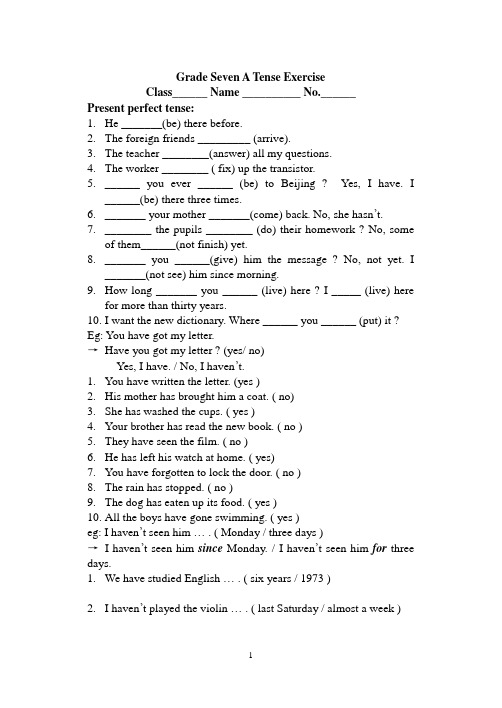
Grade Seven A Tense ExerciseClass______ Name __________ No.______Present perfect tense:1.He _______(be) there before.2.The foreign friends _________ (arrive).3.The teacher ________(answer) all my questions.4.The worker ________ ( fix) up the transistor.5.______ you ever ______ (be) to Beijing ? Yes, I have. I______(be) there three times.6._______ your mother _______(come) back. No, she hasn’t.7.________ the pupils ________ (do) their homework ? No, someof them______(not finish) yet.8._______ you ______(give) him the message ? No, not yet. I_______(not see) him since morning.9.How long _______ you ______ (live) here ? I _____ (live) herefor more than thirty years.10.I want the new dictionary. Where ______ you ______ (put) it ? Eg: You have got my letter.→Have you got my letter ? (yes/ no)Yes, I have. / No, I haven’t.1.You have written the letter. (yes )2.His mother has brought him a coat. ( no)3.She has washed the cups. ( yes )4.Your brother has read the new book. ( no )5.They have seen the film. ( no )6.He has left his watch at home. ( yes)7.You have forgotten to lock the door. ( no )8.The rain has stopped. ( no )9.The dog has eaten up its food. ( yes )10.All the boys have gone swimming. ( yes )eg: I haven’t seen him … . ( Monday / three days )→I haven’t seen him since Monday. / I haven’t seen him for three days.1.We have studied English … . ( six years / 1973 )2.I haven’t played the violin … . ( last Saturday / almost a week )3. Nobody has written to me … . ( National Day / more than a month )4.It hasn’t rained … . ( a long time / September )5.He has lived in this city … . ( he was a child / over thirty years )6.They haven’t played football … . (at least ten years / they leftschool )7.Nothing has happened … . ( you went away in May / severalmonths )8.I have worn this pair of shoes … . ( I went to middle school /about four years)9.I have not watched TV … . ( a week / last week )10.She hasn’t been to any exhibition … . ( she arrived in Shanghai /at least a month )Past tense:1.I ______ (be) in Shanghai now. But last year I ________ (be) inBeijing.2.Where _______( be) Paul this morning? He _______ (be) in theworkshop, I believe.3.________ (be) John in the reading-room yesterday afternoon ?Yes, he ____ (be)4.________(be) you at the post-office an hour ago ? No, I______(be) not. I _____(be) in the park.5._________(be) she still a nurse in 1973 ? No, she _______(benot ). She ______(be) already a doctor at that time.6.1976 _______(be) no ordinary year for the Chinese people.7.Wang Fang’s mother _______ (be not) well last autumn, but nowshe ______ (be) in good health.8._______ (be) Paul and Jane busy yesterday ? No, they ______(be not). They ______ (be) quite free yesterday.9.How _______(be) John yesterday ? Oh, he had a cold. So he____(be) absent.10.Lei Feng _______(be) a poor peasant boy before liberation.eg: He likes table tennis. →He liked table tennis.1.He studies English well.2.The pupils try to do their work well.3.Mary and Tom want bread and milk for breakfast.4.We use our books in class.5.She works hard at her lessons.6.They play ball games after class.7.The children shout during football matches.8.His brother learns to speak English.9.I finish my work before supper.10.He carries water in the morning.eg: She dances well. →She didn’t dance well.1.The teacher asks us a lot of questions.2.The train arrives on time.3.Alice joins in the game every time.4.The girls pick cotton in the fields.5.They plan to build a bridge over the river.eg: The bus started five minutes ago. →Did the bus start five minutes ago ?1.Mary called on you the day before yesterday.2.You finished the work last month.3.Mr. Smith studied Chinese ten years ago.4.the child smiled in his dream last night.5.My mother talked with my English teacher yesterday. eg: He takes the book away. →He took the book away.Did he take the book away ?1. She comes early.2. You know his name.3.Chen Ping does his work well.4.Her mother teaches English.5.He puts his books in the desk.6.The workers make a lot of new cars.7.She speaks to Mr Green in English.8.Tom gives her help.9.His father drives a bus.10.Paul reads the newspaper at breakfast.Put in the verbs in the proper tenses:1.Where _______ (be) Li Hung ?She _______ (be) in the classroom.What _______ she ______ (do) there ?She _______ (help) Kao Ping with his lessons._______ she often _______ (help) people ?Yes, very often.2.What ______ you _______ (do) ?I ______ ( read ) a new book.When ______ you ________ (buy it ?I _______ (buy ) it last week.3.They _________ (live) in Shanghai these years. A few years ago,they ______ (live) in Beijing.4.________ it __________ (rain) in shanghai these days ? No. but itoften _______ (rain) in late spring.Be going toeg: I read the book yesterday evening. ( this evening )1.He often helps Granny Li with her housework. ( this afternoon)2.I am cleaning the room now. ( tomorrow)3.She is living here these years. ( next year )4.They came to Shanghai in 1992. ( soon )5.Do you often go to the countryside ? (next month )6.Did you have a meeting last Saturday? (this coming Saturday)7.Does he sometimes work in the school factory ? ( the day aftertomorrow )8.Is it raining now? (tonight )Shall / Willeg: I am going to play basketball all afternoon.→I shall play basketball all afternoon.I’ll play basketball all afternoon.1.You are going to walk home tonight.2.She is going to mend the clothes for me.3.I am going to buy an umbrella.4.He is not going to come home today.。
Lesson 1课堂练习
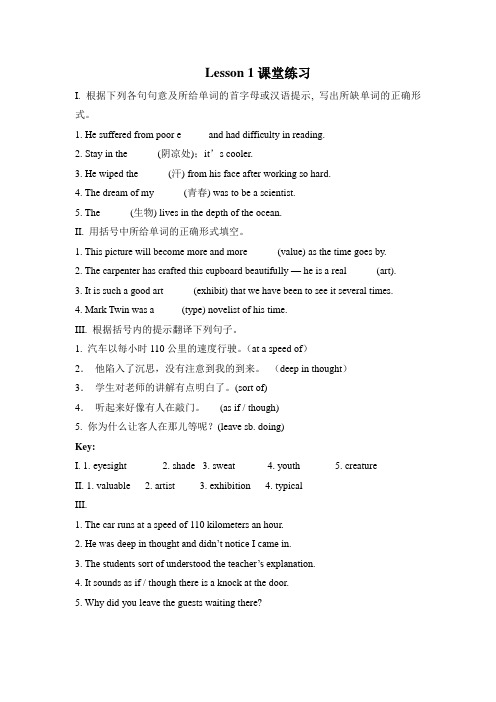
Lesson 1课堂练习I. 根据下列各句句意及所给单词的首字母或汉语提示, 写出所缺单词的正确形式。
1. He suffered from poor e_____ and had difficulty in reading.2. Stay in the _____ (阴凉处);it’s cooler.3. He wiped the _____ (汗) from his face after working so hard.4. The dream of my _____ (青春) was to be a scientist.5. The _____ (生物) lives in the depth of the ocean.II. 用括号中所给单词的正确形式填空。
1. This picture will become more and more _____ (value) as the time goes by.2. The carpenter has crafted this cupboard beautifully — he is a real _____ (art).3. It is such a good art _____ (exhibit) that we have been to see it several times.4. Mark Twin was a _____(type) novelist of his time.III. 根据括号内的提示翻译下列句子。
1. 汽车以每小时110公里的速度行驶。
(at a speed of)2.他陷入了沉思,没有注意到我的到来。
(deep in thought)3.学生对老师的讲解有点明白了。
(sort of)4.听起来好像有人在敲门。
(as if / though)5. 你为什么让客人在那儿等呢?(leave sb. doing)Key:I. 1. eyesight 2. shade 3. sweat 4. youth 5. creatureII. 1. valuable 2. artist 3. exhibition 4. typicalIII.1. The car runs at a speed of 110 kilometers an hour.2. He was deep in thought and didn’t notice I came in.3. The students sort of understood the teacher’s explanation.4. It sounds as if / though there is a knock at the door.5. Why did you leave the guests waiting there?。
Module_1_how_to_learn_English_全教案

Module 1 How to learn English一、单元教学内容分析本单元的中心话题是谈论如何学英语。
与其相关的新词汇"diary, translate, match, complete, correct, number, repeat, advice, mistake, improve, radio, newspaper, deep, breath, article, yourself, put down, think about" 等,征求和提供建议的多种英语表达。
重点:词汇---相关英语学习用语。
难点:相关英语学习的词汇,制定英语学习计划。
语言结构:should do, should not do, how about, don't forget to do, try to do, try not do, it's a good idea...二、语言知识目标1. 功能:1). 掌握征求建议的表达方式。
What can I do? What should I do? Can you give me some advice?2). 提供建议的表达方式。
How about...? Why don't you ...? You should... Don't forget ... Try (not) to...2. 词汇:diary, translate, complete, correct, number, repeat, advice, mistake, improve, radio,4. 语音:读准句子中的连读。
三、语言技能目标听:能听懂包含征求建议的问句;能听懂对方的建议。
说:能口头征求、提供建议。
读:能读懂包含建议的文章,包括书信。
写:能写出征求建议的句子,能提供书面建议。
演示与表达:能表演包含建议的对话。
四、学习策略:自学策略:能够通过阅读学习掌握一些阅读和词汇的学习策略。
u1,b1,College English exercise
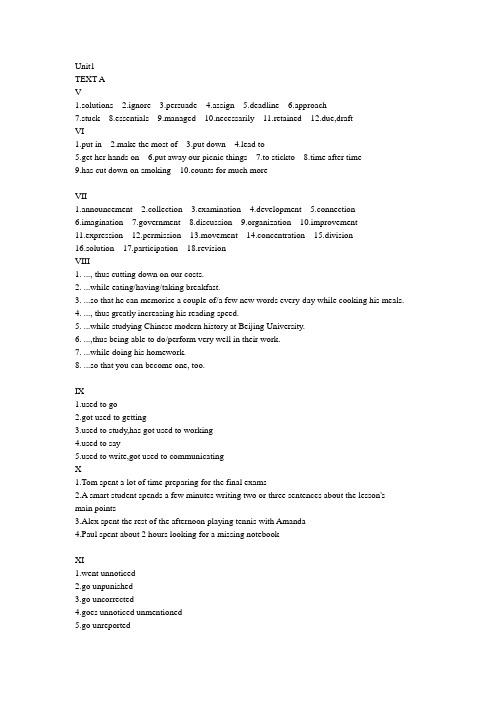
TEXT AV1.solutions2.ignore3.persuade4.assign5.deadline6.approach7.stuck 8.essentials 9.managed 10.necessarily 11.retained 12.due,draftVI1.put in2.make the most of3.put down4.lead to5.get her hands on6.put away our picnic things7.to stickto8.time after time9.has cut down on smoking 10.counts for much moreVII1.announcement2.collection3.examination4.development5.connection6.imaginationernment8.discussionanization 10.improvement11.expression 12.permission 13.movement 14.concentration 15.division16.solution 17.participation 18.revisionVIII1. ..., thus cutting down on our costs.2. ...while eating/having/taking breakfast.3. ...so that he can memorise a couple of/a few new words every-day while cooking his meals.4. ..., thus greatly increasing his reading speed.5. ...while studying Chinese modern history at Beijing University.6. ...,thus being able to do/perform very well in their work.7. ...while doing his homework.8. ...so that you can become one, too.IXed to go2.got used to gettinged to study,has got used to workinged to sayed to write,got used to communicatingX1.Tom spent a lot of time preparing for the final exams2.A smart student spends a few minutes writing two or three sentences about the lesson's main points3.Alex spent the rest of the afternoon playing tennis with Amanda4.Paul spent about 2 hours looking for a missing notebookXI1.went unnoticed2.go unpunished3.go uncorrected4.goes unnoticed unmentioned5.go unreportedinterruption/waste concentrate organize/make the most ofirrelevant Taking retain/digest/absorb whether approachesdo/perform schedule/searchXIII1.A very curious boy, Tom is interested not only in whats but also in whys and hows.2.Happiness, according to Prof. Smith, is the ability to make the most of what you have.3.You've better keep the book where your 15-year-old son can't get his hands on it.4.The story was so funny that Bill kept laughing all the time while reading it5.High-achieving students do not necessarily put in more time on their studies than their lower-scoring classmates.6.How did you manage to persuade these students to take the speed-reading course?7.Working hard is imp ortant, but knowing how to make the most of one’s abilities counts for much more.8.She asked her students to think for themselves rather than telling them what to think.TEXT BT T F F F T T TI1.opposite2.preference3.located4.feasible5.perspective6.has shifted7.concern8.attractive 9.survive 10.transfer 11.prospect 12.particularly 13.treasure 14.despiteII1.on the other hand2.keep up3.as for4.for good5.turned oute of age7.what if8.welled upExe. B 1-8 C D C A D A B BTEXT CExe. B 1-6 A C D D A B。
Unit1-Exercises
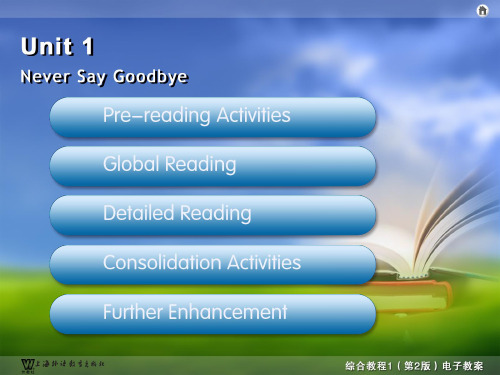
hoarse: adj. (of a person or voice) sounding harsh, especially because of a sore throat e.g. We shouted ourselves hoarse at the football match.
concrete: definite, positive e.g. The policy have nothing concrete to go on.
Vocabulary
Grammar
Translation
Integrated skills
Oral activities
Writing
Listening
Vocabulary
Grammar
Translation
Integrated skills
Oral activities
Writing
Listening
Group 4 conspicuous: very easy to notice e.g. Lincoln is a conspicuous example of a poor boy who succeeded.
e.g. And last but not least there is the question of adequate funding. final: being or happening at the end of a series of events, actions, statements, etc.; being the result of a particular process e.g. The project is in its final stages.
Exercise 1 (1)
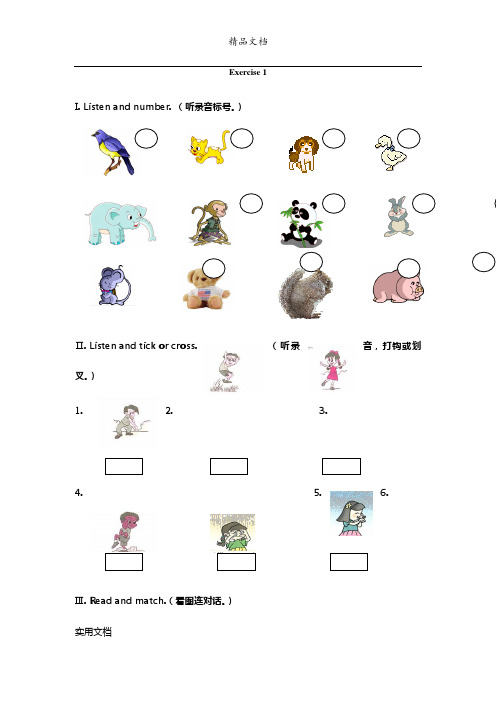
精品文档
实用文档
Exercise 1
I. Listen and number. (听录音标号。)
Ⅱ. Listen and tick or cross.(听录音,打钩或划
叉。)
1. 2. 3.
4. 5. 6.
Ⅲ. Read and match.(看图连对话。)
精品文档
实用文档
Exercise 2
Ⅰ. Listen and circle.(听录音画圈。)
1. bird bear 2. eraser elephant
3. dog duck 4. monkey mouse
5. ruler rabbit 6. pen panda
7. cat bag 8. squirrel super
II. Listen and colour.(听录音、标号并涂色。)
A: Look! I have a cat! A: I have a bear.
A: Look! I have a dog!
A: Look! I have a rabbit!
精品文档
实用文档
Ⅲ. Read and match. (看图连线。)
kangarobeaver panda eagle
Exercise_大学英语3考试试题
大学英语新理念综合教程3 ExercisesUnit 1。
Translation Page 12。
page 19 Sentence 1--—5Unit 2。
Translation Page。
36 Page 61 Sentence 1—-—-5.Unit 3。
Translation Page 61 page 70。
Sentence 1——--5.Unit 4。
Translation Page 87.Page 94 Sentence 1-—-—5Unit 5。
Translation Page111.Page 116 Sentence 1--——5Unit 6 Translation Page142page 135 Sentence 1—-—-5Unit 7 Translation Page158Page212 Sentence1——--5Unit 8 Translation Page221Page 238 Sentence1-———51. I felt uneasy for the whole day as I was __________ from deep sleep by the ringing of the telephone earlyin the morning。
A)aroused B) rose C)raised D) arose2. __________ the lake around our university was seriously polluted.A) In time B)At no time C)In times to come D)At one time3。
This college is __________ Prof Wang。
A)at the service of B) at service of C)in charge of D) in the charge of4。
Exercise 1
Exercise 1I. 完形填空I stood in the doorway, watching my elder brother carefully putting his clothes into his bag. I coughed uneasily. Finally (1)____ that I was there, Rocky turned toward me with a sad smile.“I’m (2)____ tomorrow,” he said.“I know,” My (3)___ _was almost a whisper. I was (4)____ at myself for being so weak, but I wasn’t about to cry.“My (5)____ is early, but there is still (6)____ time to come to the airport,” he said. Seeing the (7)____ look on my face, he quickly added,”I promise I won’t leave without saying goodbye.”I tried to say (8)____, but didn’t. It’s always (9)____ to keep quiet when you are about to cry. “You promised you wouldn’t cry,”he said to me, thinking that I was close to (10)____.I remember the day he taught me how to ride a bike. (11)____ I thought he was always behind me, holding the seat to keep me from (12)____. I was happy with this, but he knew he wouldn’t hold me up all my life. He told me that one day he would have to let go.His coughing stopped my thinking. What was left to say? How could I say(13)____ to the person who taught me everything?The next morning I (14)____, looked at my alarm clock, and realized he had left (15)____ ago. We never even said goodbye.Goodbye, Rocky! Although he may have been many miles away, I knew he heard me, even if it was only an answer in his heart.1.A.forgetting B.realizing C.watching D.learning2.A.arriving B.living ing D.leaving3.A.voice B.sound C.noise D.word4.A.glad B.moved C.angry D.pleased5.A.ship B.flight C.train D.bus6.A.enough B.little C.no D.busy7.A.surprised B.excited C.sad D.happy8.A.anything B.everything C.something D.nothing9.A.stranger B.better C.worse D.easier10.A.tears B.smiles C.words D.sadness11.A.At last B.From now on C.At first D.So far12.A.riding B.running C.walking D.falling13.A.goodbye B.hello C.yes D.sorry14.A.gave up B.stood up C.looked up D.woke up15.A.minutes B.hours C.days D.weeksII.语法填空:Dear pen pal,I’m having a great time in Hong Kong,. It’s a great place to visit (1)_____ I’m lucky to be here to have my six-month English course. Some other students arelearning French. I might like to learn some, (2)_____. What languages would you like to learn?There is just so much to see and do here. Last night I (3)_____(go) to a Chinese music concert. Most of my friends like loud music (4)______ they can dance to. I prefer quiet, (5)__________(tradition) music so the concert suited me fine. (6)_____ kinds of music do you like?Before the concert we went (7)_____ Italian food. Do you like? There are lots of different kinds of food here. I don’t know what to try next. What kind of food do you prefer?My host family is taking me over to an (8)_______(Italy) film festival next weekend. I’m not sure what to expect (9)______ I have never seen an Italian film. Some people say they are boring, (10)_____ others say they are great. What kinds of films do you prefer?III. 阅读理解AIn order to know a foreign language thoroughly(完全地),four things are necessary.First,we must understand the language when we hear it spoken.Secondly,we must be able to speak it ourselves,with confidence(自信)and without hesitation(犹豫).Thirdly,we must do much reading.Finally,we must be able to write it.We must be able to make sentences that are correct in grammar.There are no shortcuts to success in language learning.A good memory is a great help,but it is not enough only to memorize the rules from a grammar book.It is not much learning by heart long lists(一览表)of words and their meanings,studying the dictionary and so on.We must learn by using the language.If we are pleased with a few rules we have memorized,we are not really learning the language.We must “learn through use.” Practice is important.We must practise speaking and writing the language whenever we can.1. The most important things to learn a foreign language are_____________.A.understanding and speaking B. listening,speaking,reading and writing C.writing and understanding D. memorizing and listening2.Someone hears and writes English very well,but he speaks it very badly.This isbecause__.A.he doesn't understand the language when he hears it spokenB.he doesn't have a good memoryC.he always remembers lists of words and their meaningsD.he often hesitates(犹豫)to practise speaking it3. One can never learn a foreign language well by _____.A.doing much practice B.studying the dictionaryC.learning through use D.using the language4. Which is the most important in learning a foreign language?A.A good memory.B.Speaking.C.Practice.D.Writing.5. “Learn through use” means ______.A.we use a language in order to learn itB.we learn a foreign language in order to use itC.we can learn a language well while we are keeping using itD.B and C.BBRISBANE—Australian Olympic chief John Coates has said Greek athlete Katerina Thanou should not be awarded the Sydney Olympics 100 metres gold medal handed back by Marion Jones.Jones, who this week admitted to steroid(类固醇)use in the build up to the Sydney Games, has returned the three gold medals and two bronzes she won in 2000. But Thanou, the silver medalist in Sydney, was herself banned for two years after she failed to appear for a drug test at the 2004 Athens Olympics.“I’d like to think that Katerina Thanou would not be awarded the gold medal,” Coates told the Australian Associated Press on Tuesday, “but there may be some legal difficulties for the International Olympic Committee (IOC) to overcome in order to rea ch that conclusion.”Jamaica’s Tayna Lawrence won the 100m bronze medal in Sydney behind Jones and Thanou.Coates also said he expected the United States Olympic Committee (USOC) to hand back the medals won by the women's 4x100m and 4x400m relay teams.Two of Jones’s team mates in the 4x100m team which finished third in Sydney, Torri Edwards and Chryste Gaines, have also served doping(兴奋剂)bans.The U.S. women’s 4x100m relay team won the gold medal ahead of Jamaica and Russia.“On the relays, it’s my expectation that the United States Olympic Committee will be required to also hand back the medals won by the other ladies who competed with Jones in the two relays,” Coates said.“That is normal practice.”The United States Olympic Committee (USCO) has publicly apologized to the organizers and competitors of the 2000 Sydney Games and the Australian public for Jones’s actions.As part of the USOC’s apology, president Peter Ueberroth promised that the U.S. would send a clean team to next year’s Beij ing Olympics.6. Thanou get the Sydney gold medal because________.A. she didn’t pass the drug test.B. she served doping ban at Sydney Olympics.C. she didn’t take the drug test at Sydney Olympics.D. she ran the first at Sydney Olympics.7. Which of the following statements is True?A. Jones has got five gold medals at Sydney Olympics.B. The USCO has returned medals in the two relays.C. Jones also took part in the women’s 4x100m relay race.D. Thanou should receive Sydney gold medal.8. Why did Coates expect the USOC to hand back the medals won in the relay races?A. Because the IOC required them to do so.B. Because some of the runners of the U.S served doping bans.C. Because they didn’t take the first place in the relay races.D Because they felt sorry for Jones’s actions.9. What would probably happen next according to the passage?A. Thanou would receive Sydney gold.B. Fewer or no American athletes will serve doping drugs in Beijing Olympics.C. Jamaica’s Tayna Lawr ence would receive Sydney gold.D. Thanou wouldn’t be allowed to take part in the Beijing Olympics.10. What is the best title of the passage?A. Thanou should not receive Sydney goldB. Jones has returned the Sydney medalsC. Beijing OlympicsD. The U.S would send a clean team to Beijing Olympics.IV.选词填空.loose; on purpose; curtain; add up; ignore;face to face; upset; set down; outdoors; calm down; dusty ; be concerned about; entirely; in order to; no longer1.His income_______ to 5,000 yuan a month.2.He felt _____ about losing much money.3.Was it an accident or did Tom do it ___________?4.It’s good for us to do exercise ________ every morning.5.The boy hid himself behind the ______ and look out through the window.6.At last the wind was beginning to _________.7.Let's clean the house because it's ____ everywhere.8.I have a pain in my back. I can ________ stand it.9.He knew the speed limit but he _______ it and drove faster.10._________ make his spoken English better, he practices hard every day.。
Exercise_1
矿产资源开发利用方案编写内容要求及审查大纲
矿产资源开发利用方案编写内容要求及《矿产资源开发利用方案》审查大纲一、概述
㈠矿区位置、隶属关系和企业性质。
如为改扩建矿山, 应说明矿山现状、
特点及存在的主要问题。
㈡编制依据
(1简述项目前期工作进展情况及与有关方面对项目的意向性协议情况。
(2 列出开发利用方案编制所依据的主要基础性资料的名称。
如经储量管理部门认定的矿区地质勘探报告、选矿试验报告、加工利用试验报告、工程地质初评资料、矿区水文资料和供水资料等。
对改、扩建矿山应有生产实际资料, 如矿山总平面现状图、矿床开拓系统图、采场现状图和主要采选设备清单等。
二、矿产品需求现状和预测
㈠该矿产在国内需求情况和市场供应情况
1、矿产品现状及加工利用趋向。
2、国内近、远期的需求量及主要销向预测。
㈡产品价格分析
1、国内矿产品价格现状。
2、矿产品价格稳定性及变化趋势。
三、矿产资源概况
㈠矿区总体概况
1、矿区总体规划情况。
2、矿区矿产资源概况。
3、该设计与矿区总体开发的关系。
㈡该设计项目的资源概况
1、矿床地质及构造特征。
2、矿床开采技术条件及水文地质条件。
实践的重要性英语作文
实践的重要性英语作文关于实践的重要性英语作文范文(精选8篇)在平凡的学习、工作、生活中,许多人都有过写作文的经历,对作文都不陌生吧,借助作文人们可以反映客观事物、表达思想感情、传递知识信息。
你写作文时总是无从下笔?以下是小编收集整理的关于实践的重要性英语作文范文,仅供参考,大家一起来看看吧。
实践的重要性英语作文篇1参考范文:Nowadays many universities encourage and organize students to take part in social practice activities. During the holidays, more and more students choose to be the volunteers, take part-time jobs, or take part in other practical activities alike. It’s obvious that socia l practice is playing a more and more important role in China’s college education。
Undoubtedly, college students have benefited a lot from social practice. Above all, they are provided with more opportunities to contact the real world outside the campus. Moreover, in social practice activities, students can apply their knowledge to the solution to the practical problems. So their practical skills are improved greatly. Besides, social practice helps strengthen students’ sense of social responsibility。
- 1、下载文档前请自行甄别文档内容的完整性,平台不提供额外的编辑、内容补充、找答案等附加服务。
- 2、"仅部分预览"的文档,不可在线预览部分如存在完整性等问题,可反馈申请退款(可完整预览的文档不适用该条件!)。
- 3、如文档侵犯您的权益,请联系客服反馈,我们会尽快为您处理(人工客服工作时间:9:00-18:30)。
MSc F&A
Common-size statements
Class exercise solution
Requirement i)
Company Industry
1 Chemicals and pharmaceuticals
2 Aerospace
3 Computer science
4 Department stores
5 Consumer foods
6 Electric utility
7 Newspaper publishing
8 Consumer finance
9 Airline
Requirement ii)
The airline, consumer finance, and electric utility industries are service industries. They
are characterized by the absence of cost of goods sold and inventories. Companies 6, 8,
and 9 have the lowest ratios (COS/sales and inventories/total assets). Newspaper
publishing may also be considered a service industry; we will return to this later.
Company 8 is the consumer finance company. It has a high level of debt balanced by a
high level of receivables and investments (loans and securities). Much of its debt is
short-term, reflecting the short maturities of its loans. It has almost no fixed assets. The
ratio of interest expense to revenues is the highest for this company.
Both the electric utility and airline firms would have high fixed assets; utilities generally
have higher assets (lower asset turnover), are more profitable, and have higher debt
and interest expense. Airlines, on the other hand, have high current liabilities for trade
payables (payments to suppliers) and for advance ticket sales (other current liabilities).
We conclude that company 6 is the electric utility and company 9 is the airline.
Companies 1, 2, and 3 have high R&D expense, consistent with the aerospace,
chemicals and drugs, and computer software industries. Aerospace would have the
highest inventory (low inventory turnover). Customer prepayments under long term
contracts result in lower receivables and large customer advances (other current
liabilities). Therefore, company 2 is the aerospace firm.
Distinguishing company 1 from company 3 is difficult. Computer software and drugs are
both characterized by high R & D. The inclusion of chemicals, however, should lower
the intensiveness of R&D, suggesting that company 3 is the computer software firm.
Computer software, lacking manufacturing, is less capital intensive than chemicals and
drugs and the latter is generally more profitable. Further, the chemical industry (being
older) should have "older" plant (greater proportion depreciated). Company 1 is,
therefore, the chemical and drugs firm and company 3 is in the computer software
industry.
Companies 4, 5, and 7 remain. Company 4 has high inventories and COS, the highest
receivables relative to assets, and high asset turnover, all of which suggest a retailer. It
has no R&D, high advertising expense, and low pre-tax profit margins. Company 4 is
the department store firm.
Company 5 has high net property relative to assets, and the highest ratio of advertising
to revenues. Company 5 must be the consumer foods company.
Company 7 is the newspaper publisher. It has very low inventory but high cost of goods
sold; inventory is primarily newsprint while cost of goods sold includes the high cost of
reporting and production. Company 7 has the highest intangibles (newspapers
purchased) and very high pre-tax profit margins (most newspapers have only indirect
competition).
Summary
This exercise was intended to show that industries have balance sheet and income
statement characteristics that set them apart from others. These characteristics are
often used to compare firms within an industry (e.g. advertising as a percentage of sales
for consumer goods firms). Summarized data should be used with caution, however.
Different firms (even in the same industry) classify identical items differently. Thus the
analyst should examine original financial statements to achieve better comparability.
Differences among firms may be due to operational or classification differences. When
management is available to answer questions, these differences are often useful
starting points for obtaining a better understanding of the firm.
